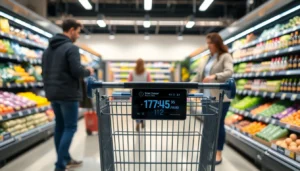Table of Contents
ToggleImagine strolling through your favorite grocery store without the hassle of manually scanning items or worrying about forgotten items. Welcome to the world of smart shopping carts, a witty little tech marvel ensuring your shopping experience is as seamless as your favorite streaming service. With advanced features that are taking the retail experience to a new level, it’s time to explore this nifty innovation that not only saves time but also keeps the wonder of impulse shopping intact.
What Is a Smart Shopping Cart?

A smart shopping cart is not your grandma’s grocery cart. These high-tech companions, equipped with sensors, cameras, and touch screens, are designed to enhance the way people shop. Imagine a cart that not only carries your groceries but also assists you in product discovery, keeps track of your spending, and even helps you find the quickest route through the store. Yes, that’s right. These carts are bridging the gap between technology and everyday life by incorporating features that can make the shopping experience smoother and more enjoyable.
For instance, smart shopping carts can use RFID (Radio Frequency Identification) technology, allowing customers to check items out by simply placing them in the cart. Meanwhile, integrated mobile apps can provide personalized promotions and real-time inventory updates, optimizing the shopping experience even further.
Key Features and Technologies
Smart shopping carts come packed with a suite of impressive features. First off, many use mapping technology to aid shoppers in navigating the store. This tech gives a visual guide, indicating where beloved items are located, so eliminating the infamous ‘where’s that aisle?’ dilemma.
Also, these carts often include weight sensors that can automatically tally up purchases, ensuring customers always know how much they’re spending. Some carts even have built-in cameras, allowing shoppers to scan items as they go, taking the burden off traditional checkout lines.
Also, with the integration of mobile app connectivity, users can enjoy an enhanced experience. You can check prices on the fly, access special discounts tailored to your preferences, and receive real-time updates about available products. It’s like having a shopping assistant follow you around, minus the need for awkward small talk.
Benefits of Using Smart Shopping Carts
The advantages of smart shopping carts are significant and numerous. For starters, they save time, an invaluable resource in today’s fast-paced world. Shoppers can skip long lines with quicker checkout processes, allowing them to spend more time enjoying their weekend rather than waiting with their arms full of groceries.
Besides, they enhance the overall shopping experience. Personalized recommendations and promotions can lead to delightful surprises, encouraging customers to try new products. They also reduce friction, as carts equipped with built-in calculators help shoppers stay within budget.
And let’s not forget about the data. Retailers can gather insights from smart carts, analyzing shopping trends and preferences. Such data allows stores to tailor their offerings, ensuring customers find what they want, essentially, a match made in retail heaven.
Challenges and Considerations in Implementation
As fabulous as smart shopping carts sound, implementing them does come with its set of challenges. First and foremost, the cost of technology can be high, posing a significant barrier for smaller retailers. Investing in the technology required for smart carts might lead to doubts about the return on investment.
Also, there’s the issue of customer adoption. While tech-savvy shoppers may be thrilled, others might feel overwhelmed by the change. Ensuring a smooth transition for every customer is crucial.
Finally, data privacy concerns can’t be ignored. With the incorporation of advanced technology comes the responsibility of safeguarding customer information. Retailers will need to prioritize security measures to protect sensitive data, so ensuring a trustworthy environment.
Future Trends in Smart Shopping Carts
Looking ahead, the future of smart shopping carts is incredibly promising. As technology evolves, expect to see deeper integration with AI and machine learning. This could allow carts to deliver even more personalized shopping experiences and tailored recommendations.
Also on the horizon is the further development of mobile payment systems. Imagine a world where your smart cart processes payments automatically as you shop, making the checkout process virtually non-existent. Also, combining smart carts with augmented reality could transform the retail environment, providing interactive elements to make shopping more engaging.
As sustainability becomes more important, expect smart carts to also reflect this trend, with features promoting eco-friendly products, or even tools that help track a customer’s carbon footprint while they shop.
Real-World Examples and Case Studies
Several retailers have already begun integrating smart shopping carts and reaping the rewards. One notable example is Walgreens, which implemented smart carts in select locations, allowing customers to scan items as they shop. Their customers reported shorter wait times and a more enjoyable shopping experience.
Meanwhile, SmartCart, a company dedicated to smart shopping innovations, has introduced carts equipped with not only a scanner and display but also automatic payment systems that make checking out a breeze.
Looking internationally, Tesco in the UK has tested its own version of smart shopping carts, gathering valuable customer data and strengthening customer engagement. These real-world implementations demonstrate the undeniable benefits and practicality of smart shopping carts in enhancing the retail experience.





